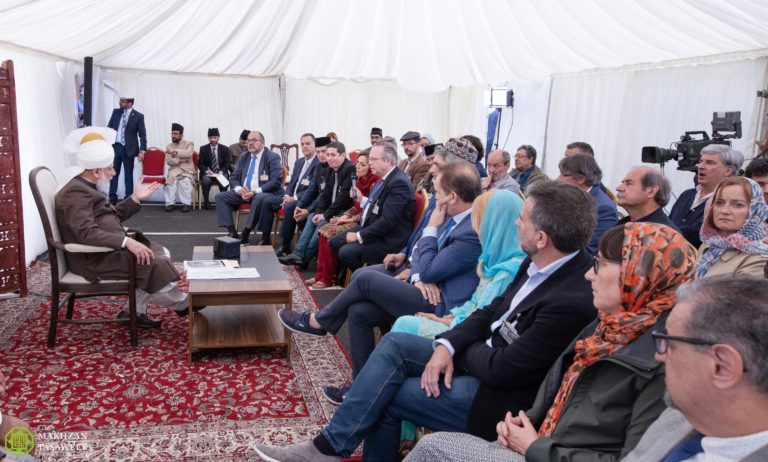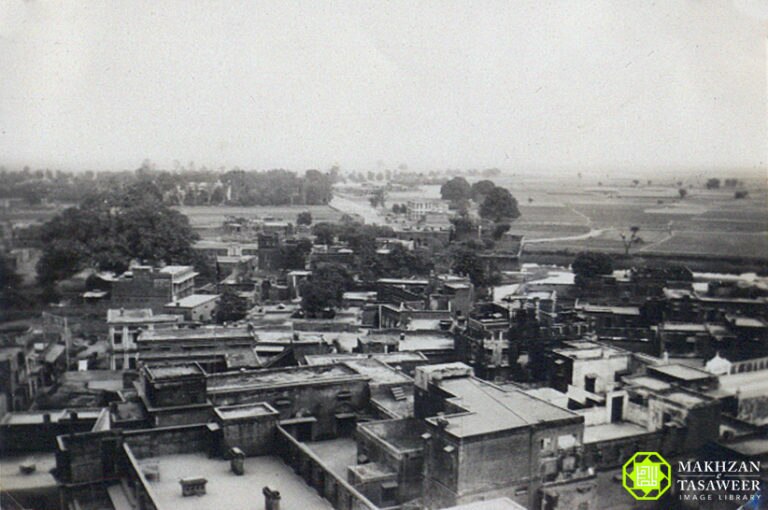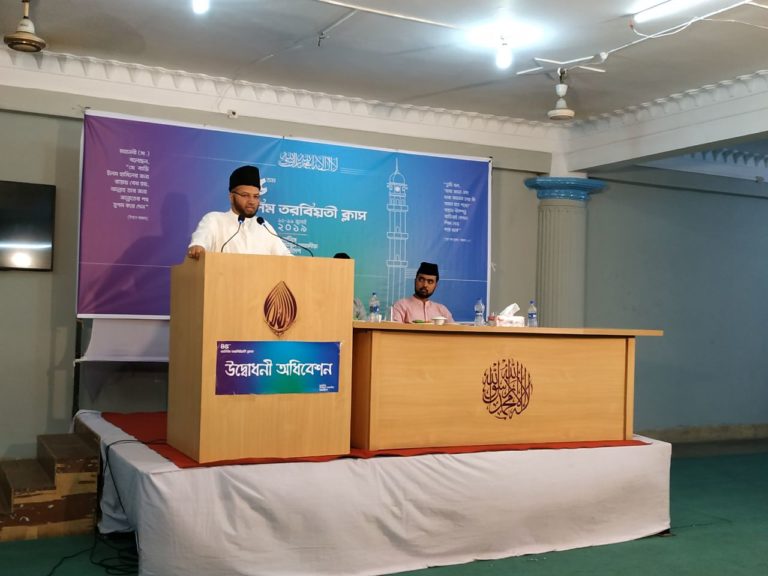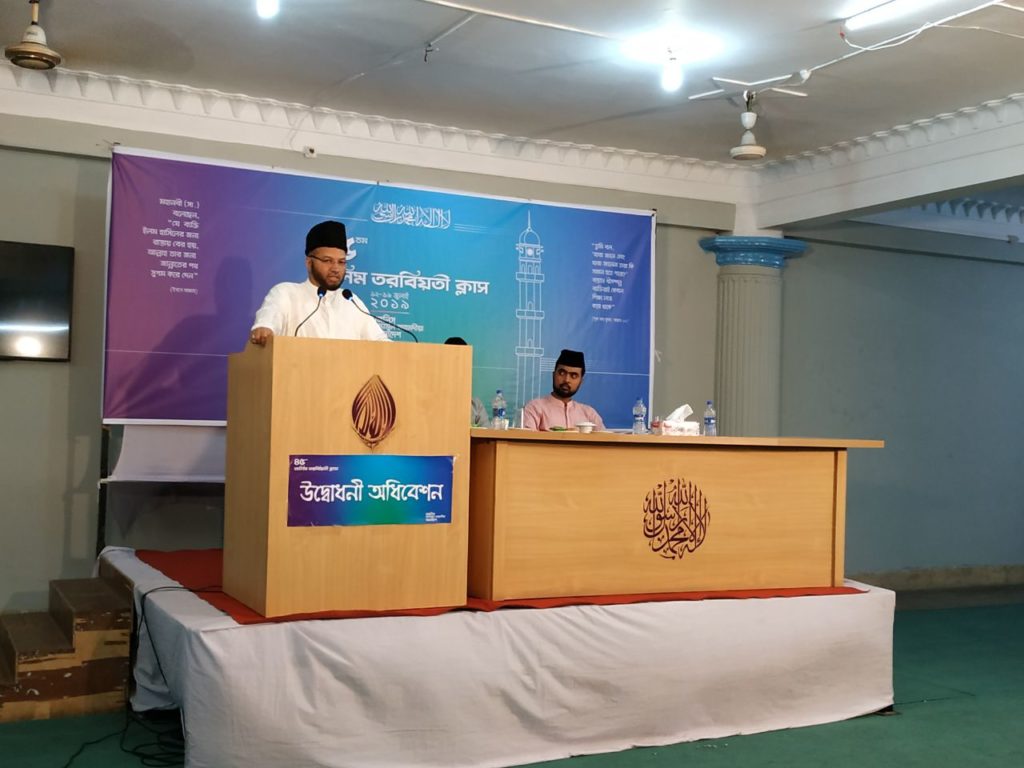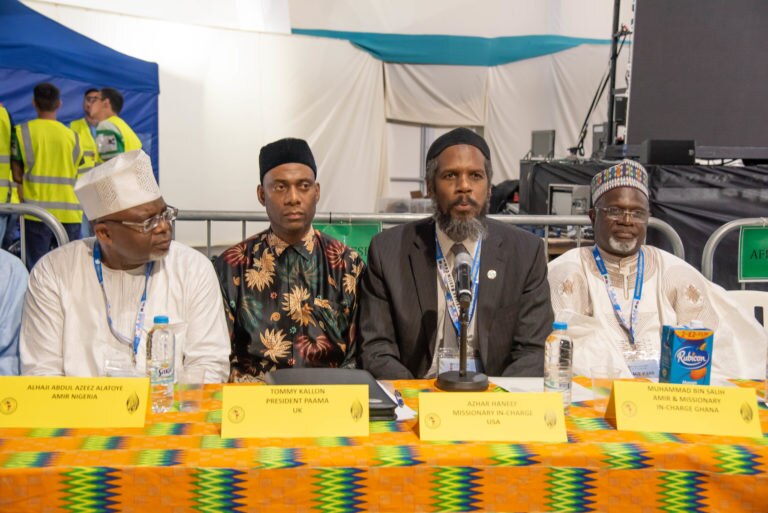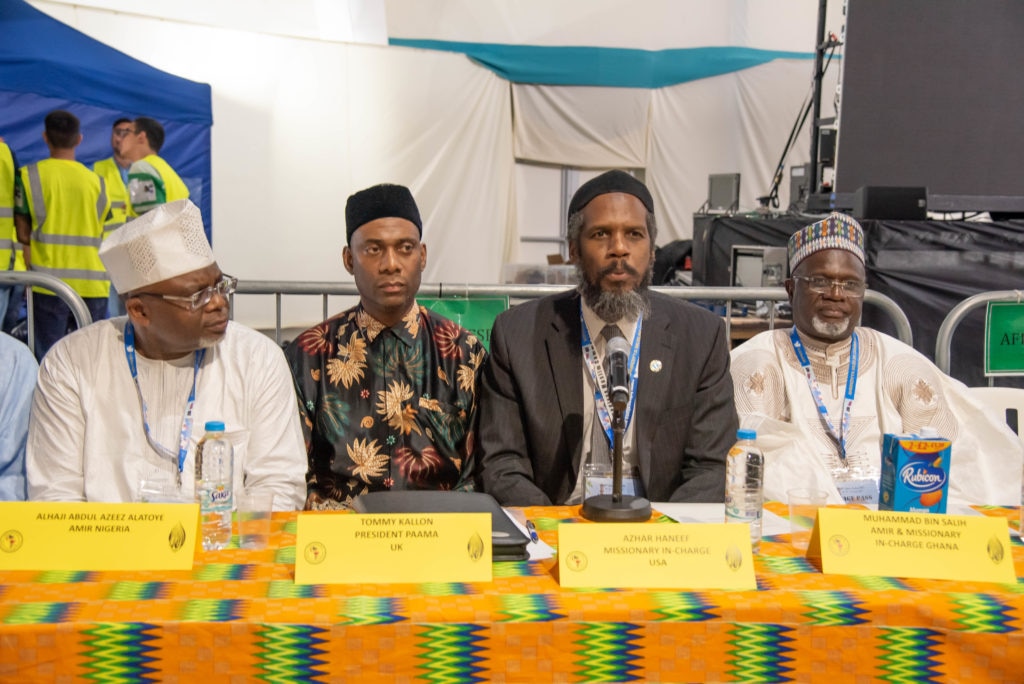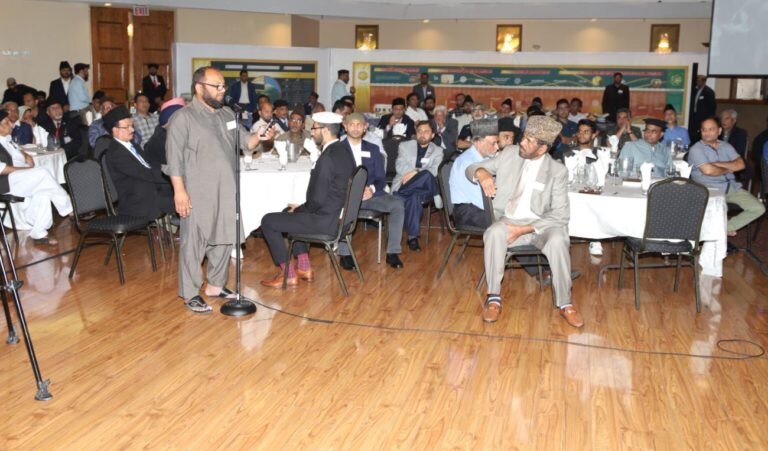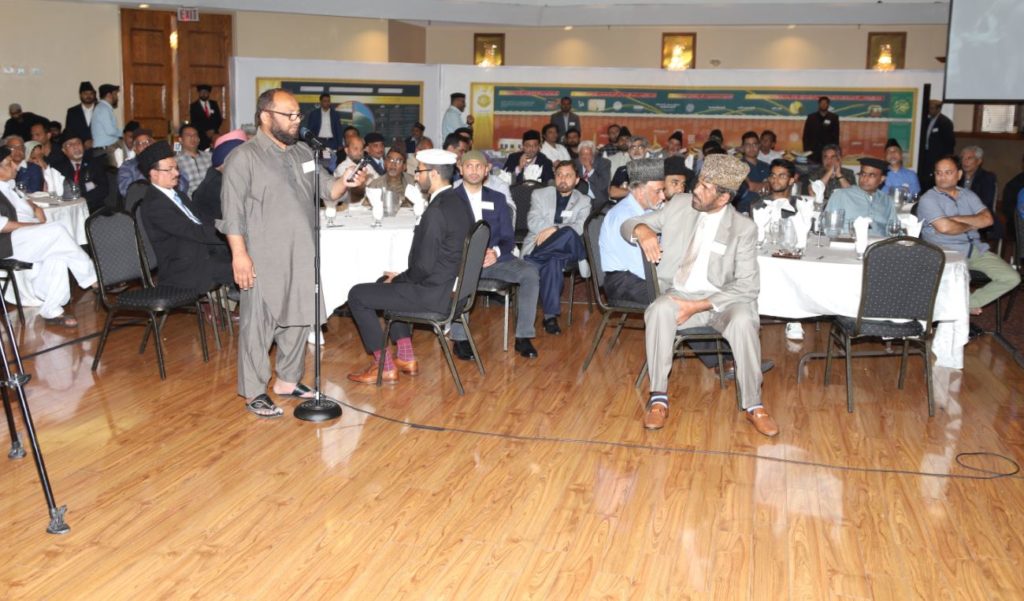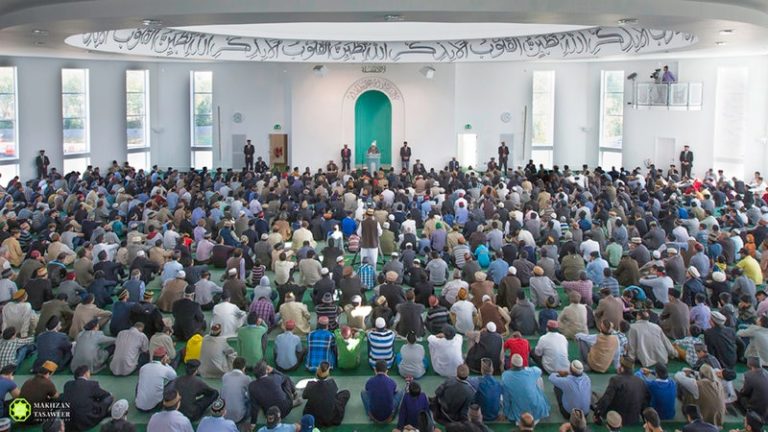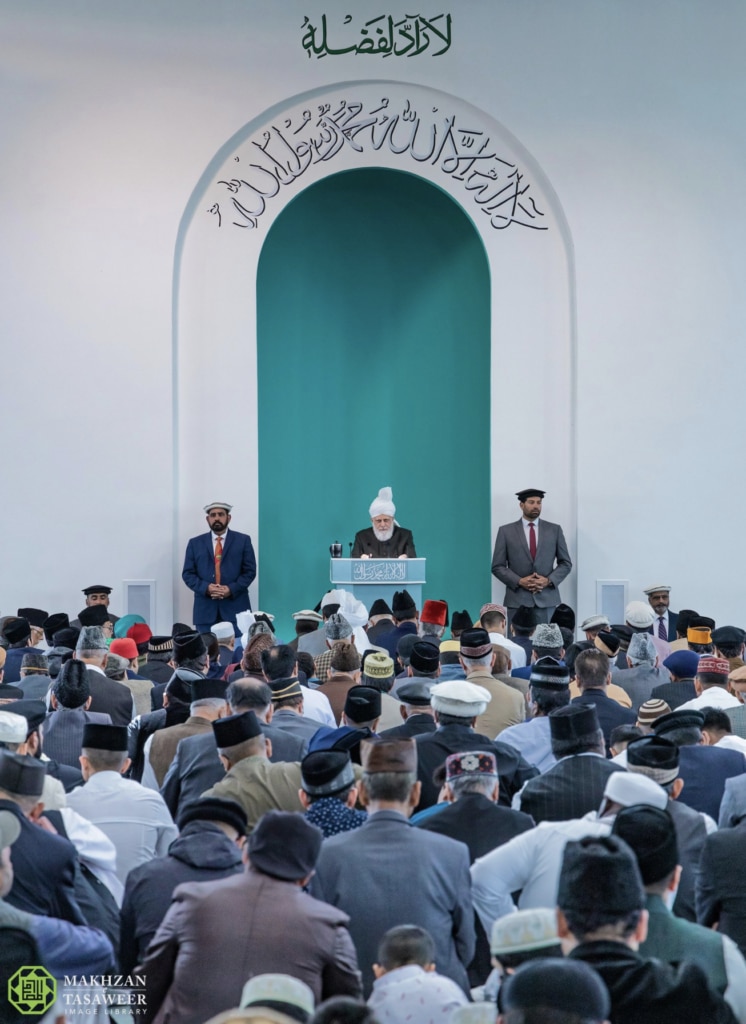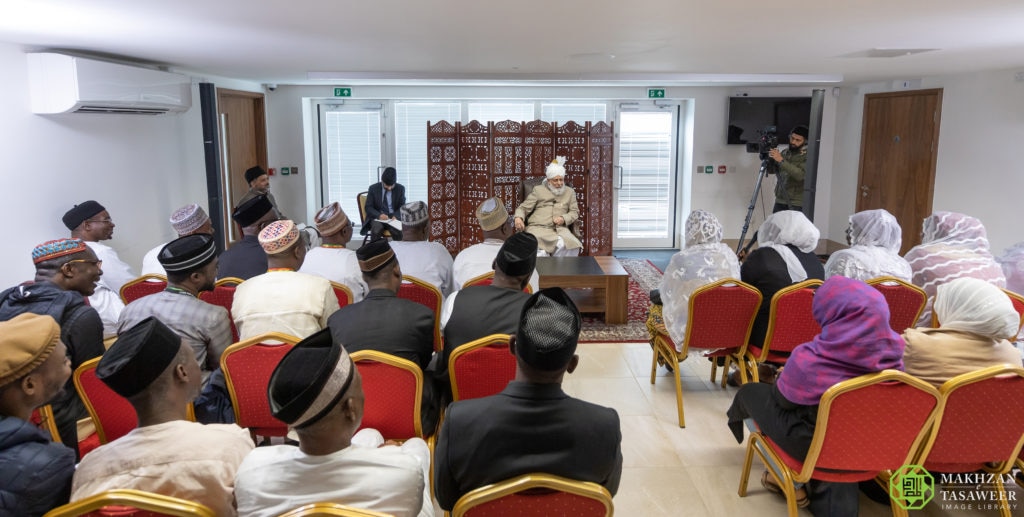
The Jalsa Salana activities of Hazrat Khalifatul Masih Vaa are not limited to three days at Hadeeqatul Mahdi. Following Jalsa Salana, the vast number of international delegates consisting of new converts, members of parliament, journalists, civil servants, professors, academics, dignitaries, religious leaders, chiefs and professionals are granted the opportunity to meet with Huzooraa.
Both Ahmadi and non-Ahmadi guests are present within these delegations. In the mulaqats, they share their sentiments regarding Jalsa, take advice and ask questions to Hazrat Amirul Momineenaa. The groups were fortunate to have personal and group pictures with Huzooraa and were also gifted books in their respective languages by Hazrat Amirul Momineenaa.
This year, the meetings were held at the new Markaz in Islamabad immediately after Jalsa Salana, on 5,6 and 7 August.
On Monday, 5 August, a group of newly converted Kurdish and Dutch guests had the opportunity to meet with Hazrat Khalifatul Masihaa. During the mulaqat, the converts expressed their happiness for meeting Huzooraa. As the mulaqat started, Huzooraa asked if it was their first time visiting the UK and how they found the Jalsa. Upon this, the new converts replied in the affirmative and said that they had found the Jalsa to be a symbol of love.
During the mulaqat, one girl requested for prayers for her mother who was suffering from progressive blindness. In response, Huzooraa graciously said, “You can use homeopathic medicine. If you write to me and send me the medical report, I will prescribe some homeopathic medicine.”
Throughout the mulaqat, Huzooraa enquired from the young new converts if they all attend school and gifted them with a pen each.
A guest from the government of Kyrgyzstan, who is an expert in religion and counter-terrorism, had the opportunity to meet with Hazrat Khalifatul Masih Vaa. At the beginning of the mulaqat, Huzooraa asked how her experience was at the UK Jalsa. She replied expressing her surprise at the discipline and the humanitarian work the Ahmadiyya Jamaat carries out throughout the year.
She further said that after seeing the prize distribution during Jalsa Salana, she really liked how the Jamaat paid special attention to education, especially for girls. During the meeting, while discussing the state of the Muslims and alluding to the fear many people have with Muslims, Huzooraa stated, “Unfortunately, this [fear of Muslims] is due to the actions and deeds of the Muslim groups. I don’t say that their fear is absolutely wrong; they’re quite right, those who fear. But they should see our example as well.”
At the end of the mulaqat, Huzooraa presented the guest with a gift of the Holy Quran and a pen.
A group of five Icelandic men had the opportunity to meet with Huzooraa on 5 August. One member, who works for the US government in international development, expressed his surprise at Huzoor’saa background in agriculture and said he that himself has an interest in agriculture and works with farmers. He went on to say that he had been travelling back and forth to Ghana and other parts of Africa and was trying to implement an irrigation facility. Upon this Huzooraa said, “They all depend on rain water. There is no irrigation facility.” Huzooraa also said, “Provide them with an irrigation facility because the soil there is very fertile.”
An integrated community
Hazrat Amirul Momineenaa then asked the guests about their professions and how they found the Jalsa. To this, they replied that they were very fascinated to see the Jalsa and expressed their surprise on how organised it was. One member asked about the challenge of integrating different cultures from across the world into one community. Upon this Huzooraa stated:
“The basic thing is the religion. If you are a true follower of religion and you believe in the true teachings, then there should not be any difficulty because the Quran states that Allah has made different tribes and ethnic groups and people of different nations.” Huzooraa further added, “If you realise this fact, then you can integrate easily.”
The mulaqat came to a close with a group picture, after which Huzooraa presented them with books.
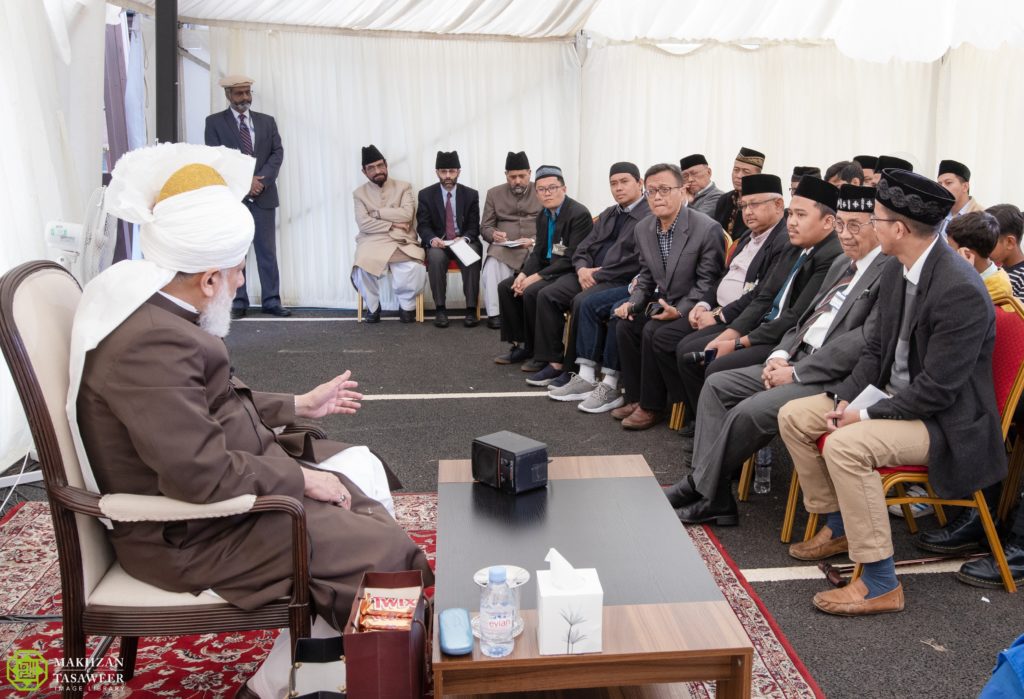
Success of a country
A three-man group from Gabon’s government had the opportunity to meet with Hazrat Amirul Momineenaa. During the mulaqat, Huzooraa asked their views on Jalsa Salana, to which they showed gratitude for being invited and said that it was very large well organised conference and were amazed at how such an event could take place with no issue.
Huzooraa said that this what is necessary for the growth and development of the world and other world leaders should try to implement this. During the mulaqat, the members of government discussed and sought advice from Huzooraa on how they can further develop their country.
Huzooraa made it clear that success lies with leaders showing absolute justice whilst also stressing the importance of education. Hazrat Amirul Momineenaa added, “We are ready to help with what we can.”
“The future of the nation is in the women’s hands”
A total of six people from Belize had the opportunity to meet with Huzooraa.
Among them was a journalist, police commissioner, organiser of Belize Basketball Tournament and a graduate of Jamiat-ul-Mubashireen Ghana. During the mulaqat, Huzooraa asked the police commissioner what he thought of the Jalsa.
Replying to this, he said that looking at the world today, the message His Holinessaa gave at the Jalsa is the right message and something there is a dire need of.
Adding to this, the journalist, who stated that she personally has committed to further support the message of Ahmadiyyat, said that Huzoor’saa address to the women was very powerful. She said that it was a message of empowering women and is very important today.
Upon this, Huzooraa stated, “The future of the nation is in the women’s hand.”
At the end of the mulaqat, all members were fortunate to have a personal picture with Huzooraa and were presented with books as a gift.
Not a new Islam
A group from Macedonia and Slovenia, consisting of lawyers, professors, doctors, students and journalists, came to see Hazrat Amirul Momineenaa on 5 August. Once everyone took a seat, Huzooraa asked how everyone was and how they saw Jalsa Salana.
One elderly lady replied by saying, “[We enjoyed it] very, very much. It was something completely new and different. What we expected from Islam, this was something new. I did not know that you exist.”
She further added that though she was a Christian, she loved Islam and enjoyed discussing the religion. Talking about Ahmadiyyat, she said:
“Now I have found another type of Islam. [This is] just what we have always wanted; something less strict, something more open, something more tolerant, something full of love, and that was this [Islam Ahmadiyyat].”
In response, Hazrat Amirul Momineenaa smiled and said, “That is the true Islam, not a new kind of Islam.”
The background to Islamabad
A reporter from the most viewed television channel in Macedonia told Huzooraa of a story he published earlier in the year, connecting Huzoor’saa address at the National Peace Symposium 2019 and the Christ Church Mosque shootings – the report proved effective in battling Islamophobia and religious radical groups, he explained.
The journalist also spoke of a new report his channel was preparing with regard to the new Islamabad Markaz. He asked Huzooraa how Islamabad was chosen as a mini city and whether there were plans to establish similar places around the world. Hazrat Amirul Momineenaa replied by saying:
“Wherever we have communities, they are trying to acquire lands. Even in Canada, we have a village there that is called Peace Village and almost 95% of the inhabitants of that village are Ahmadis.”
Huzooraa further explained the demographics of peace village and other properties of the Jamaat such as the Abode of Peace building in Canada. Regarding Islamabad, Huzooraa said that not every Ahmadi would stay here, rather only the staff and office workers of the community. Huzooraa said, “Since I am the head of the Ahmadiyya Community and I am living here, there is a need to have a centre here.”
Huzooraa also explained that all across the world, we try to establish areas where Ahmadis can live in close proximity so that mosques and other facilities are easily accessible. Hazrat Amirul Momineenaa then clarified an important point.
He said “It does not mean that we do not want to integrate with the local society. We try to integrate and this is why we announced that our multipurpose hall, just adjacent to the mosque, is open to everybody, whenever local communities want to hold their functions and they can come here.”
Huzoor’saa view on Jalsa Salana
The same Macedonian journalist asked Huzooraa about his own views concerning this year’s Jalsa Salana, whether he was satisfied with it. Hazrat Khalifatul Masih Vaa replied:
“My main concern is that whatever message we give to our community members, they digest it and practice it. And if they are doing it, that is my wish. And if it has been done, then I am happy.”
A medical doctor who attended the Jalsa Salana for the first time said that something she noticed about Jalsa Salana in particular was the welcoming nature of people and their generosity. She said that as an organisation, the Jalsa, both in the men and women’s side, was exceptional.
The nicest people
A Slovenian gentleman who is a Muslim expressed his sentiments regarding Jalsa before Huzooraa.
He said that he found the Ahmadiyya Muslim teachings very appealing and the people who were at Jalsa Salana were the nicest group of people he had witnessed.
He also mentioned that he enjoyed praying behind Huzooraa and the whole experience at Jalsa was very special for him.
Help for children
A delegation from Spain also had the opportunity to meet with Hazrat Khalifatul Masih Vaa.
Huzooraa asked the group how they found the UK Jalsa.
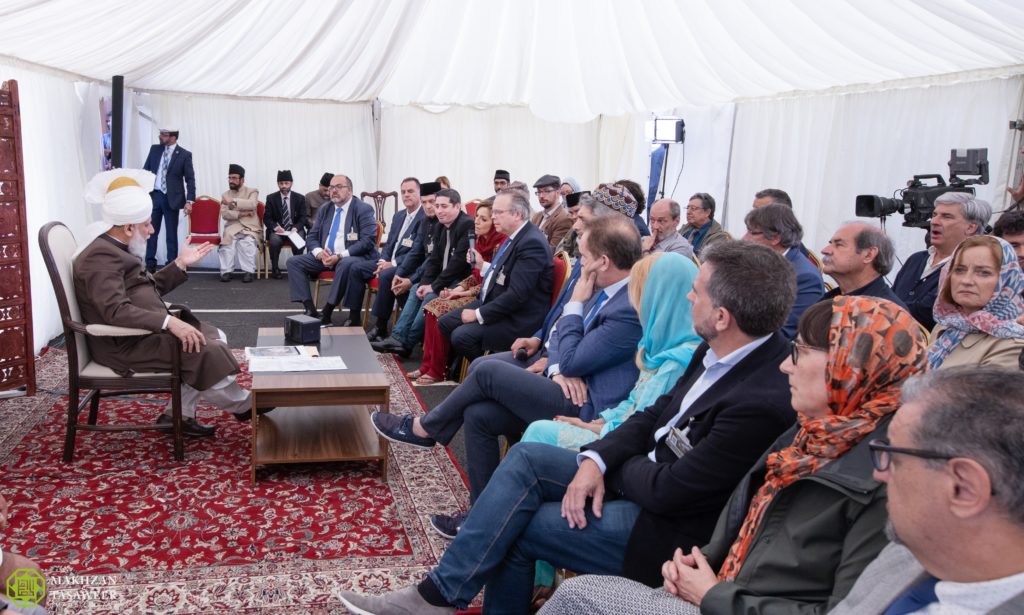
One member said that it was an honour to experience the Jalsa and stated that they wished to come back and continue learning about the Jamaat.
During the mulaqat, the group had the opportunity to ask Huzooraa various questions and seek advice with regard to their respective fields. One lady was the president of a Spanish non-profit organisation that is dedicated to help orphan children with special needs. She requested for guidance on how to further help these children. Huzooraa said, “We can also help you for giving homeopathic medicine. If you send us their symptoms and conditions, we can send some medicine which is quite helpful.”
At the end of the meeting, one lady, expressed that this was her first time visiting the Jalsa and said that the message the Ahmadiyya Community gives is something very good. She said that she hoped that the community would continue to spread this message.
A delegation from Kababir had the opportunity to have a sitting with Hazrat Khalifatul Masih Vaa on Monday, 5 August, the day after Jalsa.
As Huzooraa entered, he enquired regarding the total number of people present and further asked how everyone found the Jalsa and who was here for the first time. During the mulaqat, the group had the opportunity to share their stories with Huzooraa.
One gentleman stated that coming here after a long time, it was a surprise to see how much the Jamaat had grown and developed in the UK. His son said that during Jalsa Salana, we learnt the true essence on patience and he expressed his gratitude to Huzooraa. He stated that after coming here, he now appreciated the very busy schedule of Huzooraa and how much he does in a day.
During the mulaqat, Hazrat Amirul Momineenaa gifted the children with pens and chocolates.
“African countries emerge as leaders of the world” – Advice to politicians
Delegates from Sierra Leone consisting of member of parliament and judges met with Hazrat Khalifatul Masih Vaa.
As with all delegates, Huzooraa enquired about the sentiments and views on Jalsa Salana from the guests. Talking to a member of the new ruling party of Sierra Leone, Huzooraa said:
“Now people have voted for you, so you should work hard to get the love of people and to serve them. This is the duty and responsibility of the ruling party because Islam says and the Holy Prophetsa said that a leader of the nation is the servant of the nation, so this should be in your mind all the time.” Advising further, Huzooraa said:
“If political parties stick to their manifestos, then you can bring a very significant and big change in your country. But unfortunately, in our countries, including Pakistan, our manifestos are very positive and give hope to the people. But when the time comes for implementation, all the politicians withdraw and they make so many excuses. So there should not be any excuse.”
Speaking of service, Hazrat Amirul Momineenaa added:
“If you want to improve your nation, if you want to improve your country, then Allah the Almighty has given you the opportunity to serve your nation and you should make the best use of it. There should not only be an ambitious manifesto and no result.”
Speaking of developed countries, Huzooraa explained:
“European countries and Western countries; why are they developed countries? Because they at least implement and work on their manifestos. At least 70 percent of their manifesto is followed by the parties, the leader of the house and the head of the country. But in our countries, I don’t think we implement or work on 10 percent of whatever we have given within our manifesto.”
There was a member of the opposition party also present. Huzooraa made light hearted remarks concerning both the ruling party and opposition to which all members of parliament laughed and enjoyed the remark.
Talking to both the opposition and ruling party members, Huzooraa said:
“The opposition should not be for the sake of opposition. Wherever you feel that something is good for the nation and it has been presented before the house by the government, the opposition should help them. The government should also see that if the objections raised or the suggestions given by the opposition in any of the bills are good, then you should accept them. This is how you can work amicably and be helpful for the progress of your nation. And I pray that Allah the Almighty gives both of you the opportunity to join hands together and work for the betterment of the nation.”
Further, Huzooraa clarified that he was neither with the opposition or the ruling party.
Concluding, Huzooraa said, “I pray and wish that African countries emerge as the leaders of world.”
Jihad, brotherhood and progress
A group also travelled from Senegal for the Jalsa Salana and they also had the chance to sit with Huzooraa.
Upon being asked about how they found the Jalsa Salana by Huzooraa, one member replied by saying, “I was very impressed with the Jihad the Jamaat is doing by publishing a great deal of literature about Islam.”
Another guest said, “I have been very deeply affected. Wherever we go, people greet us with great brotherhood”.
One guest had attended the Jalsa Salana UK twelve years ago. Hazrat Amirul Momineenaa asked him what difference he felt this year. Passionately, he replied, “It is as if I am experiencing a dream … This year, my faith has increased manifold. The Jamaat is truly progressing”.
Delegates from various South American countries also had the opportunity to meet with Huzooraa.
An Anglican bishop from Ecuador expressed his sentiments about Jalsa saying that it helped in changing his misconceptions about Islam and that “it was an intellectual experience but with a special spiritual aspect present”.
The bishop spoke of the peaceful environment at Jalsa. Upon this, Huzooraa said, “Being a religious leader, I think this is the main thing which needs to be created among those people whom you are leading and this is the behaviour your followers should show. Now, when you are going back, tell them that this is how you can progress.”
The minister of religion from Paraguay had only visited the last day of Jalsa Salana. Nevertheless, he said “I am amazed because of the level of commitment of the people working. Most of them are voluntary people and even kids [are] serving water. This is a strong message for us.”
Huzooraa responded and told the minister that this was how one can discipline a nation, by training children from a very young age. A university professor of Islam from Uruguay expressed her desire to work closely with the Jamaat and to establish religious dialogue. Huzooraa advised the professor on possible peace events that can take place in South America amongst various religious communities.
Grandson for the service of Islam
A large delegation from various other Russian states visited Hazrat Amirul Momineenaa, which included new converts. The first Ahmadi convert of Kazakhstan was present, who said that he wanted to present his grandson (who was also present) for the service of Islam Ahmadiyyat and to be raised with the guidance of Hazrat Khalifatul Masih Vaa.
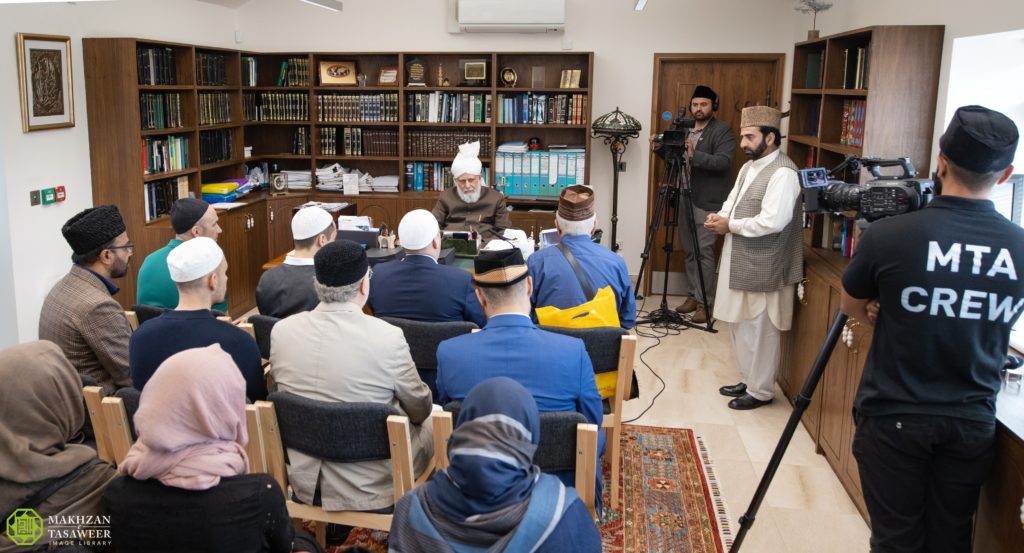
Upon this, Huzooraa asked if his grandson would do this out of his own free will. The reply from both the grandson and his grandfather was in the affirmative. Huzooraa acknowledged and appreciated the sentiment of both.
One member who has a PhD in philosophy and religion commended Hazrat Khailfatul Masih IV’srh book, Revelation, Rationality, Knowledge and Truth and the connection between science and religion presented within the book.
Comparing the Bible and the Holy Quran
Members from Argentina travelled for the Jalsa. They too had the opportunity to meet with Huzooraa. One Christian lady said she wanted to know more as she found the Jamaat very interesting.
Huzooraa asked her if she was practising her faith, to which she said that she was. Huzooraa smiled and replied:
“That is good. Whatever religion you hold, you must at least practice it and try to find out the common things in the Bible and the Quran. When you find out, then try to see what is extra in the Quran and what was the need of another book. Increase your knowledge, not to change your religion, but to increase your knowledge.”
A lady who works in the press and communication department for the Argentinian government shared her sentiments to Huzooraa. Emotionally, she said how great her experience was during the Bai‘at ceremony. She said that she wanted to tell everyone about her experience.
Another guest described the Jalsa as “one of the most impressive experiences of my life”.
He also said that he developed great respect for Huzooraa during his visit this year.
A diplomat commended the works of the missionary in Argentina.
Ahmadiyyat in Argentina
A journalist asked Huzooraa what the plans and projects are within Argentina. Huzooraa replied by saying:
“We are new in Argentina. Our mission is in its infancy in Argentina. Our message is the message of love, peace and harmony – the message which Islam gives to everyone. It is written in the Holy Quran that you must give your message of love, peace and harmony and let the people understand their duties … whether people join the community or not, people like this message. It is the message the world needs today.”
The journalist asked Hazrat Amirul Momineenaa if he planned to visit South America. Huzooraa responded by saying that he does desire to visit South America and that he shall include Argentina when he visits.
To various guests, Huzooraa reiterated that though they may not be religious or Muslims, the important point is that everyone is one community and the creation of God – religion puts humanity first.
A new convert requested Huzooraa to give him a Muslim name. Upon reflection and asking his own opinion, Huzooraa presented him with the Muslim name, Bashir.
Next, French speaking members of parliament and a chief from Burkina Faso came to meet Huzooraa. At the very beginning of the meeting, a member stood up.
Hazrat Amirul Momineenaa requested him to take a seat, to which he replied that whenever one speaks to an elder, he felt that they should stand before them. Huzooraa replied by saying, “I believe a guest should be seated with respect.”
The delegation appreciated this gesture from Hazrat Khalifatul Masih Vaa.
One guest spoke of the spiritual atmosphere of Jalsa Salana and how he greatly benefitted from Huzoor’saa address.
A spell of magic
Two delegates from Benin came to meet Huzooraa, one of whom was a member of parliament. Describing Jalsa Salana, the MP said, “It was a great experience and we cannot put it into words … I still cannot understand what magic spell you have that no incident took place.”
Huzooraa replied saying, “I believe this discipline will be within our Ahmadis in Benin as well.”
The MP expressed that such an event, without the presence of police, is not possible in Benin. Upon this, Huzooraa remarked how it would be possible when Ahmadis organise an event there.
The MP said that if this happens, it would be an example for everyone within Benin.
Shoulder to shoulder
The chief priest of Shinshoji Temple, a Buddhist leader from Japan, congratulated Huzooraa for the new Mubarak Mosque.
He said, “Participating in the Jalsa Salana this year, I had previously vowed that I would stand shoulder to shoulder with the aims and objectives of Huzooraa.”
Further, he added, “The address Huzooraa delivered regarding the need for religion and the teachings of the Quran, I will myself implement”.
He also commended the efforts by Hazrat Sir Zafrulla Khanra, the first foreign minister of Pakistan and president of the International Court of Justice, for his efforts towards Japan after WWII.
The Buddhist leader also took advice from Huzooraa regarding a third world war and politics concerning Japan.
“Once a friend, always a friend”
The chief emir of Niger State (within Nigeria) met with Huzooraa, accompanied by his family. He thanked Huzooraa for the invitation to Jalsa Salana and commended the mission of the Ahmadiyya Jamaat in Niger State.
He said that seven years ago, he made the intention to visit Jalsa Salana and now, he finally made it. The emir acknowledged that his misconceptions about Ahmadis not being Muslims vanished after observing the Jalsa Salana and hearing the recitation of the Quran, listening to speeches about the Holy Prophetsa and the salutations of Salaam he heard at the Jalsa.
Huzooraa extended the offer of friendship to the emir, which pleased the emir very much.
Huzooraa commented by saying, “We believe, once a friend, always a friend”.
The emir said he wants to visit in the future and understand the Jamaat further. The emir also requested Huzooraa to lead silent prayer for them.
Huzooraa accepted and raised his hands for dua.
“Love for all, hatred for none”
A member from the government of Haiti met with Huzooraa. He conveyed salutations from members of the Haiti government.
Speaking of the Jalsa, he said, “I thank you for the speeches you delivered, in particular, the topics of those addresses. At this Jalsa, I have gained a lot of knowledge about the Jamaat. I will go back and tell the government about the efforts the Ahmadiyya Community is exerting for humanity.”
Further, he said, “The Ahmadiyya Jamaat will surely spread in Haiti due to its motto of ‘Love for all, hatred for none.’” In response, Hazrat Amirul Momineenaa said that politicians must exert effort in spreading this motto and once this is achieved, the populace will gain trust within them.
The best of humanity
A government spokesperson and a regional governor from The Gambia had the opportunity to meet Hazrat Amirul Momineenaa.
When asked about their views on Jalsa, the government spokesperson said, “I described the gathering as ‘The best of humanity gathering.’”
“Very impressive”, and “very inspirational” were some of the words used by the spokesperson to describe Jalsa.
He further voiced that he was not surprised with the great discipline and organisation of the Jalsa as he was a former student of Nusrat High School, a school of the Ahmadiyya Muslim Jamaat. Hearing this, Huzooraa smiled and commented, saying, “So you know how we Ahmadis work?”
The member of government spoke highly of his schooling experience and the values he was taught by Ahmadi teachers.
Talking of the Jamaat’s impact, he said, “We are deeply touched by the Jamaat’s impact on Gambia and on Gambians, from health to education, psychologically, sociologically and spiritually.”
A considerably large delegation from the USA who attended Jalsa Salana also had the opportunity to meet Huzooraa. The large group consisted of men, women and children. Huzooraa first asked the women about their sentiments regarding Jalsa Salana.
Various women expressed their positive experiences of Jalsa Salana. Hazrat Amirul Momineenaa also listened to the impressions of the men as well.
A convert said that the hospitality of Jalsa Salana UK is like the USA Jalsa, “but it’s much more special being here with you Huzooraa”, he said.
A young convert told Huzooraa that he was accepted into Jamia Ahmadiyya Canada and desired to become a missionary.
In response, Huzooraa told him to be determined to never leave Jamia until he completes his course.
During the mulaqat, Hazrat Amirul Momineenaa also gifted pens to the students within the delegation.
A large delegation from Ghana also met with Hazrat Amirul Momineenaa, consisting of men and women. Huzooraa said that the meeting would start with the sentiments of the women first, followed by the men.
As with all groups, Huzooraa asked the gathering whether they liked Jalsa Salana and what their impressions were.
The ladies gave positive feedback and took the opportunity to request for prayers from Huzooraa. The men also introduced themselves. Some, Huzooraa had recognised from his years in Ghana prior to Khilafat.
The men also took the opportunity to seek prayers from Huzooraa and expressed their positive sentiments. How to improve Chanda Answering a question about how to improve Chanda contributors, Huzooraa advised:
“You should not force [members of the Jamaat], just ask them and tell them of the importance of financial sacrifice … Reach out to them personally and make them realise the importance of financial sacrifice.”
Huzooraa also said that those earning less are usually the better Chanda payers compared to those with a steady income, therefore a plan should be made to encourage those who lapse in paying Chanda.
One delegate enthusiastically said that he was a student at a school in Salaga when Huzooraa was headmaster.
Another large delegation included those from Indonesia, Malaysia and Thailand. The meeting started with Hazrat Amirul Momineenaa asking the ladies to present any questions or share sentiments.
One lajna member took advice on how to organise Ijtemas with the refugee crisis present in Thailand, Huzooraa advised to hold small regional Ijtemas with the purpose of training members.
The standard of purdah
Answering a question regarding the standard of purdah, Huzooraa said that the Quran should be followed and modesty is key. The head and bosoms must be covered, but at the same time, lower dresses should be very modest and cover the legs.
Huzooraa said that if someone is not observing purdah, they cannot be office-bearers. Only those who observe purdah can be in the amilas.
The only Muslim leader to spread the true Islam
A non-Ahmadi professor of Islamic Studies also came with the delegation. He expressed his happiness to meet Huzooraa for the second time.
He also spoke of how he teaches the true teachings of Ahmadiyyat to his students. He had also written a thesis on Ahmadiyyat in western Java.
The professor described the Jalsa as “incredible”.
Addressing Huzooraa, he said, “I think you are the only one of the spiritual leaders now who will spread out the true Islam all over the world.”
Huzooraa advised him to tell this to his colleagues when he returns to his country. The professor also desired for Indonesian journalists to come to Jalsa Salana and report on the true facts about Ahmadi Islam.
Huzooraa encouraged the professor to use his influence and make such arrangements, while also advising the Jamaat of Indonesia to pursue inviting journalists. The professor passionately said that he would inform journalists and would further write about the Jamaat.
During the meeting, Hazrat Amirul Momineenaa listened to the views of members regarding Jalsa Salana and answered any questions they had.
Pens were graciously gifted by Huzooraa to the students present.
On 7 August, a new convert from the Cayman Islands had the opportunity to meet with Hazrat Amirul Momineenaa. At the beginning of the mulaqat, Huzooraa asked when this lady accepted Ahmadiyyat. She replied that she had accepted in March 2019.
Huzooraa then asked what she thought of the Jalsa to which she replied that she was very much inspired by the Bai‘at and Huzoor’saa Friday Sermon.
Enquiring about the career she wanted to pursue in the future, she replied by saying that she had two things in mind – law or marketing. Hearing this, Huzooraa replied, “I recommend you study law, then human rights law and then practice women’s rights.” After this, Huzooraa graciously gifted her with a pen.
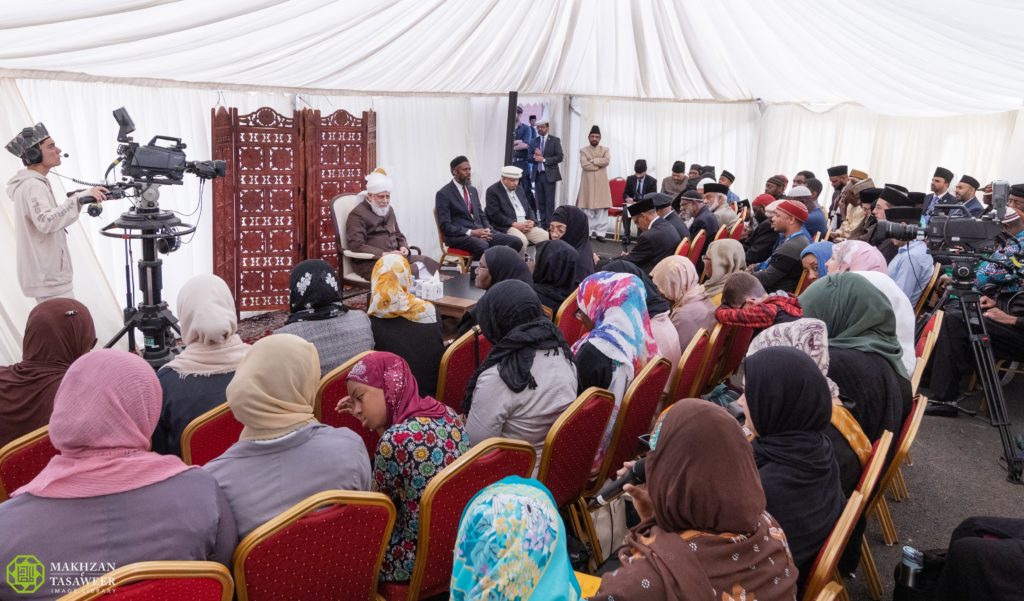
The true essence of Islam
An inspector of religious affairs and a government official from Cameroon had a meeting with Hazrat Khalifatul Masih Vaa on 7 August.
Huzooraa asked how they found the UK Jalsa, to which the inspector of religious affairs stated that this Jalsa, being an international Jalsa, captured the true image and essence of Islam and that in this day and age, there is a dire need of a leader who can guide all the Muslims to the true Islam.
He further expressed that after seeing how well organised the Jalsa was, it is was as if the Holy Prophetsa is among us.
He then said, after seeing the way everyone was treating each other, it was as if it is only the Ahmadis who are acting upon the true teachings of Islam.
Alluding to Huzoor’saa speeches, he stated that he wished to have a copy of all of them so that he can go back and tell his people back at home. Upon this, Huzooraa answered in the affirmative and stated, “You shall receive them translated into the French language.”
Huzooraa thanked the guest for coming and said, “May Allah bless you.”
Huzooraa further stated, “All that you have seen here at Jalsa is the true Islam, which the rest of the Muslims today have forgotten.”
Huzooraa added, “I pray that all Muslims over the world be those who act upon the true teachings of Islam.”
Huzooraa then turned to other guests and asked about the Jalsa.
A lady expressed her positive views about Ahmadiyyat and the Jalsa.
A Muslim group from Bosnia and a guest also had the opportunity to meet with Huzooraa. At the start, Huzooraa asked if they all enjoyed the UK Jalsa. Upon this, one person, who had attended the Germany Jalsa before, stated that the UK Jalsa was entirely different.
He further expressed that this was his third Jalsa. Huzooraa then said, “In Germany we have a ready-made facility that we utilise for Jalsa, whereas here we have to create a village ourselves.”
Huzooraa then advised them that, as Muslims, if we remember our purpose and the Islamic teachings, we can then spread the true Islam.
Huzooraa then gifted two children who were present with chocolates and pens.
Selfless service for humanity
A representative of the president of Liberia met with Hazrat Amirul Momineenaa. The guest expressed his gratitude towards Huzooraa for the invitation and stated that he was going to take back a very positive message to his country.
He stated that he wished every religion preached peace like the Ahmadiyya Community. He further stated that even in his own country, the services the Ahmadiyya Community was rendering is very good. Huzooraa remarked, “They are there for the service of humanity, not to earn money.”
He then requested Huzooraa to pray for the country as the president is a young man and the country’s economy is not so good. Upon this, Huzooraa prayed, “Allah bless your country; Allah bless your government; Allah give them the strength to serve the nation with all their potential and capabilities so that they prosper. And Allah let the people understand their duty towards their government.”
At the end, Huzooraa thanked the guest for coming and said, “Extend my greetings and well wishes to your president.”
A one-to-one address
A journalist from Albania had the opportunity to meet with Huzooraa.
In the meeting, Huzooraa asked the journalist what he thought of the Jalsa. Upon this, the journalist stated that he was very much impressed with Huzoor’saa speech on the first day.
He further stated that it did not feel as if Huzooraa was addressing all members but as if it was a one-on-one personal address.
The journalist said that when he came here, he saw the slogan “Love for all, hatred for none” and further said that after listening to Huzoor’saa speech, he felt that this was not a slogan but a philosophy. A delegation from Brazil had the opportunity to meet with Huzooraa. At the start of the mulaqat, Huzooraa enquired how they were. Upon this, one guest, whilst thanking Huzooraa for the invitation, expressed his feelings saying that it was a very emotional experience and said that this Jalsa would change his life for the better.
Lifetime friendship
One guest from Brazil expressed his gratitude towards the Jamaat and the message the Ahmadiyya Community is spreading. He then thanked Huzooraa for his leadership and further went on to invite Huzooraa to Brazil as a sign of gratitude. Upon this, Huzooraa stated, “Insha-Allah, we will try to make a plan.”
Huzooraa further stated, “Once we extend the hand of friendship, we don’t turn back.”
Upon this, the guest said that he would hold onto this friendship for his entire life.
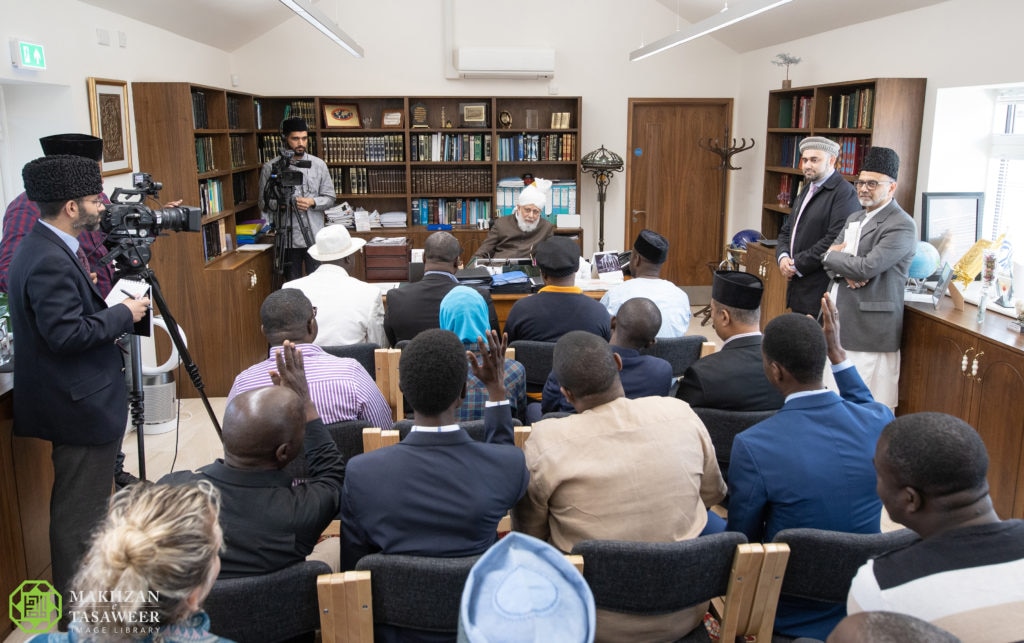
Leaders and subjects
Another guest, who is a journalist, stated that he was very impressed to see how organised the Jalsa was and to see so many people from different walks of life happily together.
He further requested Huzooraa to give a message to the people of his country.
Upon this, Huzooraa stated, “The message is this: There are two types of people, leaders and the people. Islam’s teaching regarding leadership is that the leader of the nation should serve the nation.”
Huzooraa further stated, “It is necessary for people to follow the policies raised by the government and to also work towards the betterment of the country.”
A group on new converts from Mexico had a mulaqat with Hazrat Amirul Momineenaa.
During the mulaqat, Huzooraa asked the new converts what they thought of the UK Jalsa.
Upon this, one guest replied that he was very much impressed and said that he had no words to express how he felt.
Another guest, whilst exhibiting his gratitude said that he was very thankful to Huzooraa and to all those involved in making the Jalsa.
He further stated that the most iconic thing was the international Bai‘at. Near the end of the mulaqat, Huzooraa said, “May Allah increase you all in faith and certainty. And may you all go back and preach the true teachings of Islam, and may your actions be in line with its teachings.”
A group from Latin America had the opportunity to meet with Huzooraa.
One guest said that this was their fourth visit to the UK Jalsa and the last time she visited was year before. Upon this, Huzooraa asked if she saw any difference. The guest answered by saying that there was a huge difference, which she was unable to express through words.
A new name
One Muslim guest named Carlos requested Huzooraa if he could give him an Islamic name. Upon this, Huzooraa asked what the meaning of Carlos was. Hearing this, another guest said that its equivalent in English is Charlie. Huzooraa then graciously named him Khalid and said, “Khalid means something which remains forever.” Huzooraa then prayed, “May your faith remain strong forever.”
The guests expressed their views of Jalsa and said that they really enjoyed listening to Huzoor’saa speeches and said that it was completely different to the Islam portrayed in the media.
The role of Ahmadiyyat in
Islam A group of Ahmadis from Mayotte Island and a journalist had the opportunity to meet with Huzooraa.
In the beginning of the mulaqat, Huzooraa enquired from the Ahmadi family what they did. Huzooraa then gifted all guests with a pen each.
During the mulaqat, the journalist said she had a few questions she wished to ask. The first question she asked was how Islam Ahmadiyyat is different to other sects of Islam.
Upon this Huzooraa stated, “This is the same Islam that was brought by the Holy Prophetsa and the same teaching revealed to the Holy Prophetsa.”
Huzooraa further stated: “Islam means peace, not extremism. It was prophesied by the Prophetsa of Islam that in the latter days, with the passage of time, the true teachings of Islam would be forgotten by the majority of Muslims and clerics and scholars would try to make their own interpretations of the Holy Quran.
At the time, the Promised Reformer would come, who we believe is the Promised Messiahas, and the guided one and will revive the true teachings of Islam.”
Huzooraa then stated, “So, we have accepted that man who was the founder of the Ahmadiyya Community … This is the main difference.”
This is just a glimpse into the busy schedule and countless engagements of Hazrat Amirul Momineenaa after Jalsa Salana UK 2019.
Aside from these mulaqats, personal mulaqats have been held in the evenings almost daily since Jalsa, and many other events have taken place.
May Allah bless the health and schedule of Hazrat Khalifatul Masih Vaa and may we all assist him in carrying the name of Islam towards victory and triumph.

